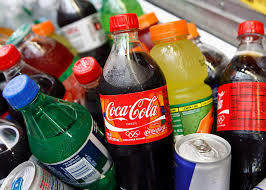
While there is rising awareness among consumers about the excessive consumption of sugar in various products, people have been talking about the sugar content in soft drinks.
Singapore is one city state that has been drawing a campaign to fight diabetes and in order to limit the sugar content of drinks they sell in Singapore, seven major drinks companies including Coca-Cola and PepsiCo have taken a pledge to do so.
Bringing it in line with many Western nations that have sought to mitigate the health risks associated with sugar through measures such as taxes and warning labels, Singapore is one of the first countries in Asia to target sugary drinks.
In the race to cut sugar and introduced more options to cater to increasingly health-conscious consumers, beverage firms have been reworking on their recipes globally.
An industry pledge to remove by 2020 drinks that contain more than 12 percent sugar from their portfolios of sugar-sweetened beverages has been signed by the aforesaid seven companies, Singapore's ministry of health said on Tuesday.
F&N Foods, Malaysia Dairy Industries, Nestle, Pokka and Yeo Hiap Seng are the companies that are included in the pledge in addition to Coca-Cola and PepsiCo.
"In addition to this industry commitment, Coca-Cola Singapore is making an additional commitment to reduce the sugar content in our portfolio of sugar-sweetened beverages by 10 percent by 2020," Coca-Cola said in an email to the media.
It said that it had been offering more new drinks with low sugar content or no added sugar and had been reducing sugar and calories across many of its brands.
According to market research firm Euromonitor, with Singapore at 11.99 grams, the daily sugar consumption per capita from soft drinks has risen since 2010 to 6.08 grams in Asia-Pacific in 2016. Consumption of sugar, compared to the countries in the Asia-Pacific region, is still higher in Europe and the United States even while it has been trending lower there.
"Governments in Asia are actively promoting healthy consumption, such as Malaysia which launched its Healthier Choices Logo in April 2017," said Euromonitor International analyst Nathanael Lim. "Consumers also have an increasing preference for beverages containing natural ingredients with zero sugar."
Even though fat and salt in processed foods were also to blame, the best way to curb excessive weight and prevent chronic diseases such as diabetes was to drink fewer calorific sweet drinks, the World Health Organization said last year.
While Indonesia and India have been considering similar taxes, the Philippines has slapped levies on sugar-sweetened beverages, among other Asian countries.
Singapore Prime Minister Lee Hsien Loong urged people to drink water, eat wholemeal bread and brown rice, but did provide details while mentioning about the drinks makers' agreement in a speech on Sunday.
(Source:www.reuters.com)
Singapore is one city state that has been drawing a campaign to fight diabetes and in order to limit the sugar content of drinks they sell in Singapore, seven major drinks companies including Coca-Cola and PepsiCo have taken a pledge to do so.
Bringing it in line with many Western nations that have sought to mitigate the health risks associated with sugar through measures such as taxes and warning labels, Singapore is one of the first countries in Asia to target sugary drinks.
In the race to cut sugar and introduced more options to cater to increasingly health-conscious consumers, beverage firms have been reworking on their recipes globally.
An industry pledge to remove by 2020 drinks that contain more than 12 percent sugar from their portfolios of sugar-sweetened beverages has been signed by the aforesaid seven companies, Singapore's ministry of health said on Tuesday.
F&N Foods, Malaysia Dairy Industries, Nestle, Pokka and Yeo Hiap Seng are the companies that are included in the pledge in addition to Coca-Cola and PepsiCo.
"In addition to this industry commitment, Coca-Cola Singapore is making an additional commitment to reduce the sugar content in our portfolio of sugar-sweetened beverages by 10 percent by 2020," Coca-Cola said in an email to the media.
It said that it had been offering more new drinks with low sugar content or no added sugar and had been reducing sugar and calories across many of its brands.
According to market research firm Euromonitor, with Singapore at 11.99 grams, the daily sugar consumption per capita from soft drinks has risen since 2010 to 6.08 grams in Asia-Pacific in 2016. Consumption of sugar, compared to the countries in the Asia-Pacific region, is still higher in Europe and the United States even while it has been trending lower there.
"Governments in Asia are actively promoting healthy consumption, such as Malaysia which launched its Healthier Choices Logo in April 2017," said Euromonitor International analyst Nathanael Lim. "Consumers also have an increasing preference for beverages containing natural ingredients with zero sugar."
Even though fat and salt in processed foods were also to blame, the best way to curb excessive weight and prevent chronic diseases such as diabetes was to drink fewer calorific sweet drinks, the World Health Organization said last year.
While Indonesia and India have been considering similar taxes, the Philippines has slapped levies on sugar-sweetened beverages, among other Asian countries.
Singapore Prime Minister Lee Hsien Loong urged people to drink water, eat wholemeal bread and brown rice, but did provide details while mentioning about the drinks makers' agreement in a speech on Sunday.
(Source:www.reuters.com)














